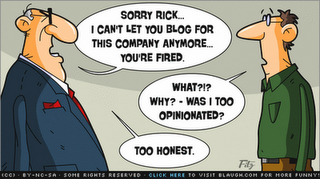
Wednesday, December 2, 2009
Use of Blogs in Organizational Context

The number of organizations that has started to create blogs in increasing ,bellow is a link to show examples of organizations that are putting blogs to good use:
http://www.netsquared.org/blog/amysampleward/organizations-putting-blogs-good-use
Advantages:
1. Quick And Easy
It is quick and easy to build and might be done by one technician, while in comparison setting up a website takes more time and might need more than one technician .
2. Inexpensive setup
It is allot cheaper then setting up a website since there are already free blogging services such as Blogger available, and usually it only need one technician to do it
3. Builds Stronger and more loyal relationships
Blogs have potential to help the organization develop stronger relationships and brand loyalty with its customers, as they interact with the 'human face' of the organization through blogs. [1]
4. Reduces cost of hiring additional employees.
By posting information about the products on your blog you might decrease the number employees hired to answer the endless questions received by phone calls and E-mails.
5. Feedback and Gaining an Insight into your Customers
The comments that customers leave can be used for more than just collecting feedback , in addition is can be used as a mean to understand you customers and how they react to each post.
6. Accessible
It does’t matter whether you are not, but you and your company will appear to be more accessible especially if you allow freedom for all your visitors to post comments. Accessibility is often a stumbling block for many potential customers that still prefer to deal with companies offline. A blog makes you more approachable and so alleviates this concern.[2]
Disadvantages
1. Maintenance
Like practically everything else on the Web, blogs are easy to start and hard to maintain. Writing coherently is one of the most difficult and time-consuming tasks for a human being to undertake. So, far from blogs being a cheap strategy, they are a very expensive one, in that they eat up time. As a result, many blogs are not updated, thus damaging rather than enhancing the reputation of the organization. [1]
2. Can be a source of trouble
Blogs can create trouble for company and create confusion for the customers if they they are not coherent and misleading.
3. Imitation of competitive advantage
Blogs are a great way to share information and ideas with customers and suppliers, but since blogs are free for everyone to see chances are that competitors might take this competitive advantage and imitate it.
4. Poorly Written Blogs
The best non-corporate blogs are spontaneous and genuine. Poorly written corporate blogs can look fake or perhaps worse, they reveal incompetence on he part of the writer. [3]
http://www.netsquared.org/blog/amysampleward/organizations-putting-blogs-good-use
Advantages:
1. Quick And Easy
It is quick and easy to build and might be done by one technician, while in comparison setting up a website takes more time and might need more than one technician .
2. Inexpensive setup
It is allot cheaper then setting up a website since there are already free blogging services such as Blogger available, and usually it only need one technician to do it
3. Builds Stronger and more loyal relationships
Blogs have potential to help the organization develop stronger relationships and brand loyalty with its customers, as they interact with the 'human face' of the organization through blogs. [1]
4. Reduces cost of hiring additional employees.
By posting information about the products on your blog you might decrease the number employees hired to answer the endless questions received by phone calls and E-mails.
5. Feedback and Gaining an Insight into your Customers
The comments that customers leave can be used for more than just collecting feedback , in addition is can be used as a mean to understand you customers and how they react to each post.
6. Accessible
It does’t matter whether you are not, but you and your company will appear to be more accessible especially if you allow freedom for all your visitors to post comments. Accessibility is often a stumbling block for many potential customers that still prefer to deal with companies offline. A blog makes you more approachable and so alleviates this concern.[2]
Disadvantages
1. Maintenance
Like practically everything else on the Web, blogs are easy to start and hard to maintain. Writing coherently is one of the most difficult and time-consuming tasks for a human being to undertake. So, far from blogs being a cheap strategy, they are a very expensive one, in that they eat up time. As a result, many blogs are not updated, thus damaging rather than enhancing the reputation of the organization. [1]
2. Can be a source of trouble
Blogs can create trouble for company and create confusion for the customers if they they are not coherent and misleading.
3. Imitation of competitive advantage
Blogs are a great way to share information and ideas with customers and suppliers, but since blogs are free for everyone to see chances are that competitors might take this competitive advantage and imitate it.
4. Poorly Written Blogs
The best non-corporate blogs are spontaneous and genuine. Poorly written corporate blogs can look fake or perhaps worse, they reveal incompetence on he part of the writer. [3]
FOR MORE ABOUT THE ADVANTAGES AND DISADVANTAGES:
URL Sources:
[1] http://archive.websitenotes.com/websitenotes-37-20040823BlogsandBloggingAdvantagesandDisadvantages.html
[2] http://www.webreference.com/authoring/bus_blog/
[3] http://www.enterpriseblogs.info/corporate-blogging/disadvantages
[1] http://archive.websitenotes.com/websitenotes-37-20040823BlogsandBloggingAdvantagesandDisadvantages.html
[2] http://www.webreference.com/authoring/bus_blog/
[3] http://www.enterpriseblogs.info/corporate-blogging/disadvantages
Subscribe to:
Comments (Atom)